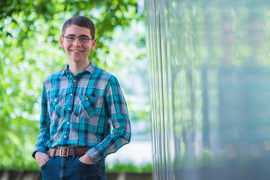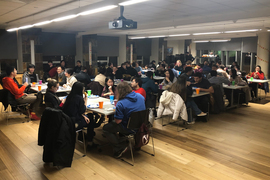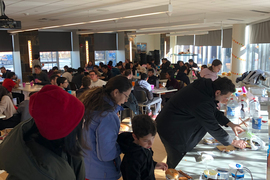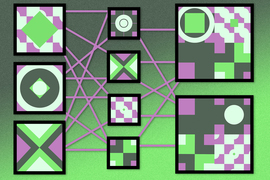From an early age, Will Sussman’s family instilled in him the value of education. “I don’t think it’s a coincidence that most of my grandparents were teachers,” he says. Now, at MIT, “The energy of a campus, bustling with students, in turn energizes me.”
A second-year doctoral student in electrical engineering and computer science and affiliate of the Computer Science and Artificial Intelligence Laboratory (CSAIL), Sussman channels that energy into his graduate research, which focuses on building better computer networks.
One of his projects seeks to quickly localize faults in networked applications, while another seeks to enable critical communications during Internet blackouts. Outside of the lab, he dedicates his free time to the MIT Jewish community through MIT Hillel, and to his alma mater through the Yale Club of Boston.
A programmer at heart
Sussman has always been fascinated with technology. “We all use the internet, but most people take it for granted. I wanted to know how it works,” he says. This fascination led him to a degree in electrical engineering and computer science at Yale University. As a sophomore, he asked to join the lab of one of his professors. Sussman admits, “At that point, I didn’t actually know what research was.” Nevertheless, it was a great fit. “It was cool to be testing ideas that had never been tested before.”
Even though his undergraduate research on wireless communications mainly consisted of programming, Sussman never considered himself a programmer. “I started in electrical engineering and added computer science later, but I still thought of myself as an electrical engineer,” he explains. By a happy chance, when he applied to MIT for graduate school, one computer science professor did recognize his skills as a programmer: Hari Balakrishnan, the Fujitsu Professor of Computer Science and Artificial Intelligence. “Now I understand that I’m a computer scientist,” Sussman says with a laugh.
As a graduate student in the Networks and Mobile Systems group, Sussman joined a collaboration with researchers at the University of California at Berkeley and New York University. They call the project “Where’s The Fault?” or WTF — something you might exclaim when your internet application fails. Together they published a paper, “The Case for an Internet Primitive for Fault Localization,” and their follow-up work is ongoing.
Concurrently, Sussman is working on a second project, called CityMesh, which seeks to enable critical communications during internet blackouts, such as those caused by natural disasters. “We believe it is possible in cities with a certain density to construct a decentralized network of wireless devices,” he says. For this work, he received a travel grant to attend the International Conference on Mobile Systems, Applications, and Services this summer in Helsinki, Finland.
Cultivating community through shared traditions
Outside of his research, Sussman dedicates much of his free time to MIT Hillel. After participating in their First-Year Graduate Students program, he joined the GradHillel board as social chair. In that role he led several events, from “Quarantaschen Baking” to a “Shabbarbecue.” He is currently president of GradHillel.
Sussman’s goals as social chair went beyond planning community events. “I think it’s important to demonstrate Jewish culture at a time when antisemitism is on the rise,” he says. To that end, he invited the broader MIT community to participate in a favorite family tradition. “Every year on Christmas, my parents would invite our extended family and Jewish friends to our house for bagels and egg creams — a distinctly Brooklyn Jewish beverage — followed by a trip to the movies and a Chinese restaurant.” With funding support from the Office of Graduate Education, Sussman sent the sign-up form to all of the graduate administrators, two graduate residences, and the International Students Office, which forwarded it to MIT’s international graduate and undergraduate students.
With 155 responses, “the full-day event grew to a scale wildly beyond what Sussman expected. In the short time period of six days, in which he was finishing finals and preparing for an international trip, he pivoted his day-long program so that he could accommodate every MIT student who wanted to attend,” says Natalie Yosipovitch, director of graduate student engagement at MIT Hillel. To meet the unexpected demand, Sussman bought all of the lox at two supermarket locations, booked an entire movie theater, and ordered about $1,000 of kosher Chinese food.
In addition to his involvement with MIT Hillel, Sussman fosters connections among alumni of his alma mater as chair of the Young Alumni Committee at the Yale Club of Boston, and he was recently elected to the board of directors. He also runs and cycles along the Charles River, exchanging workout statistics with his labmates.
Although he has just two years of graduate school under his belt, Sussman is considering a career in academia. Yet he is also intrigued by government service and plans to complete the MIT Graduate Certificate Program in Science, Technology and Policy. This summer he is conducting research at the National Institute of Standards and Technology. By the time he graduates, he says, “I hope to have an understanding of systems that scale, nationally and globally.”















